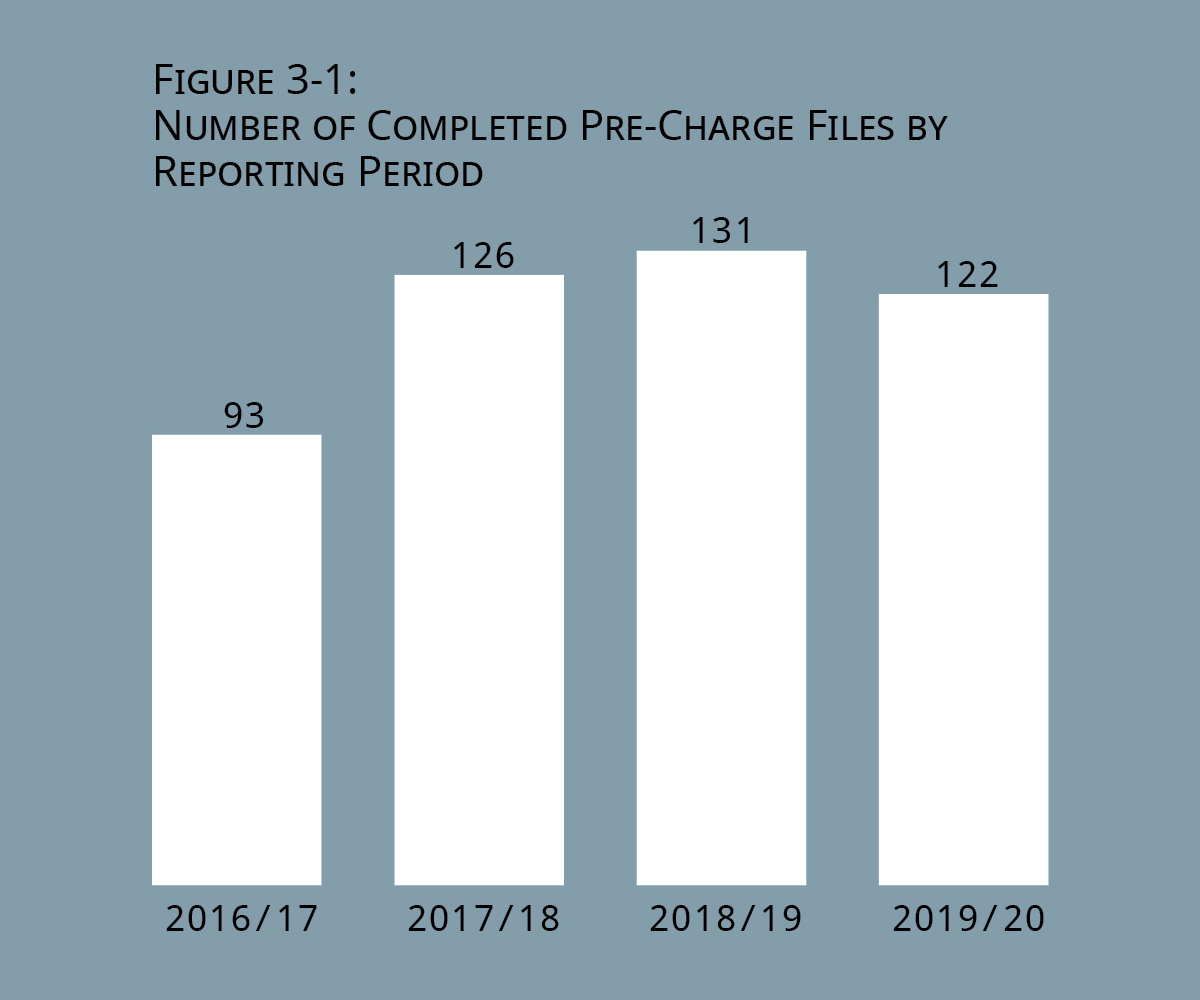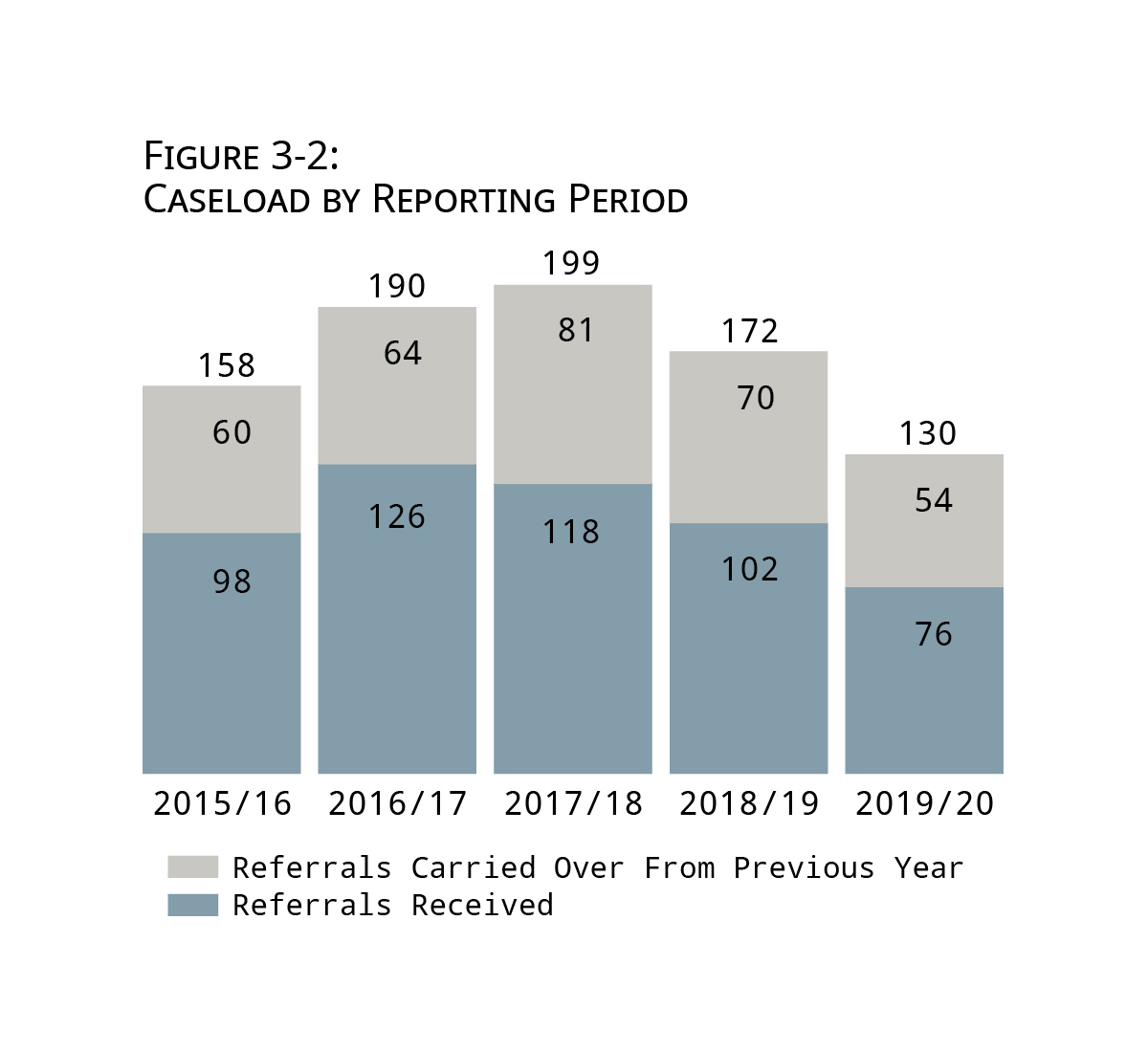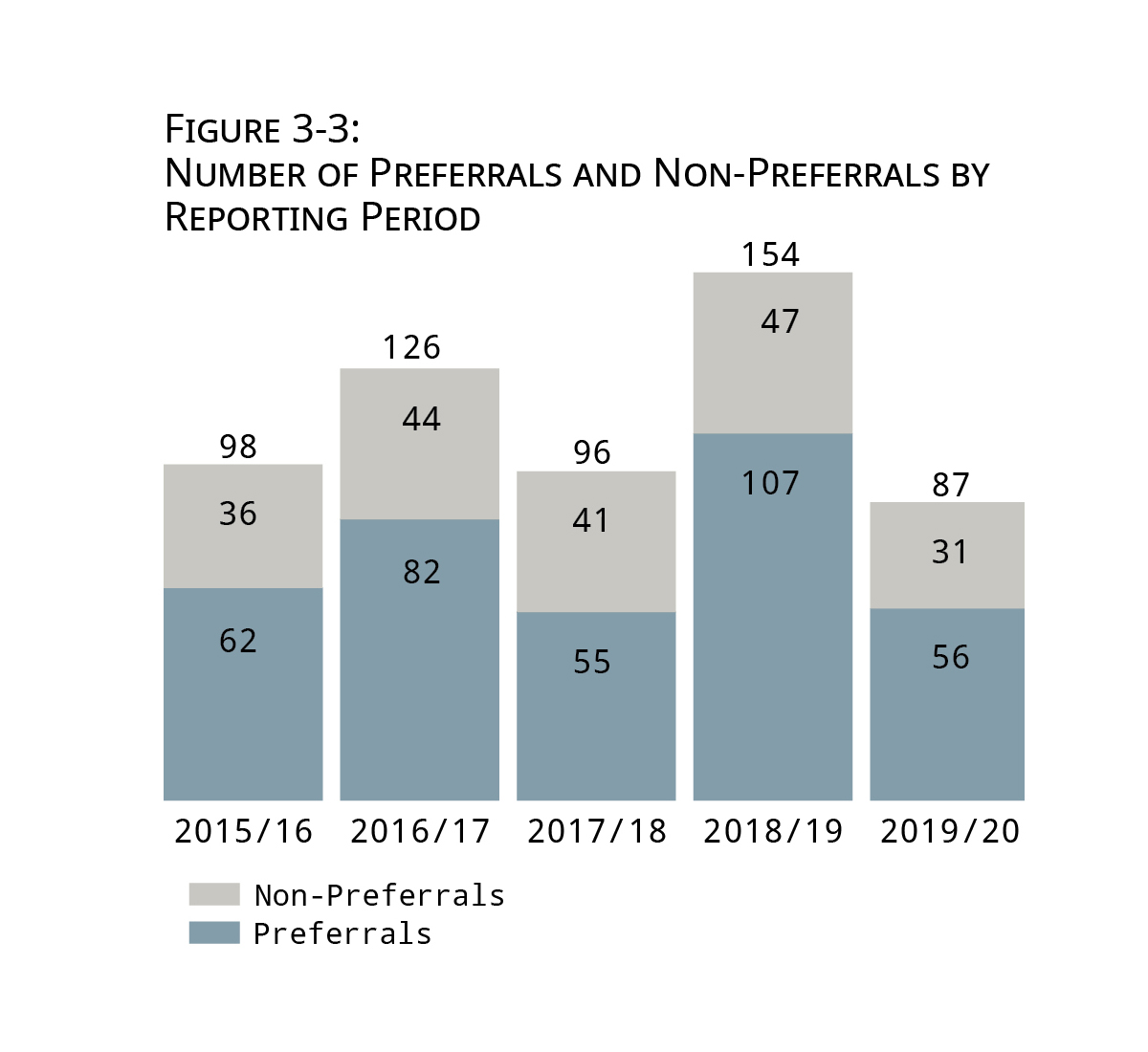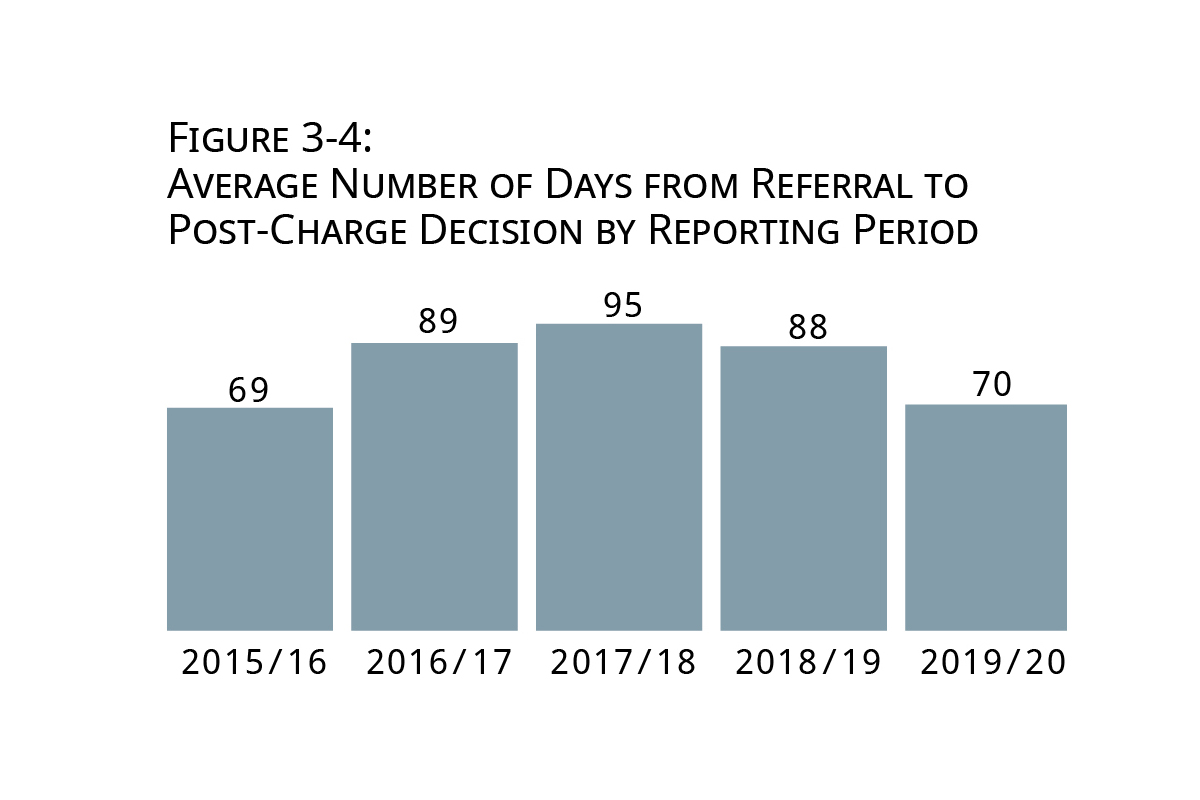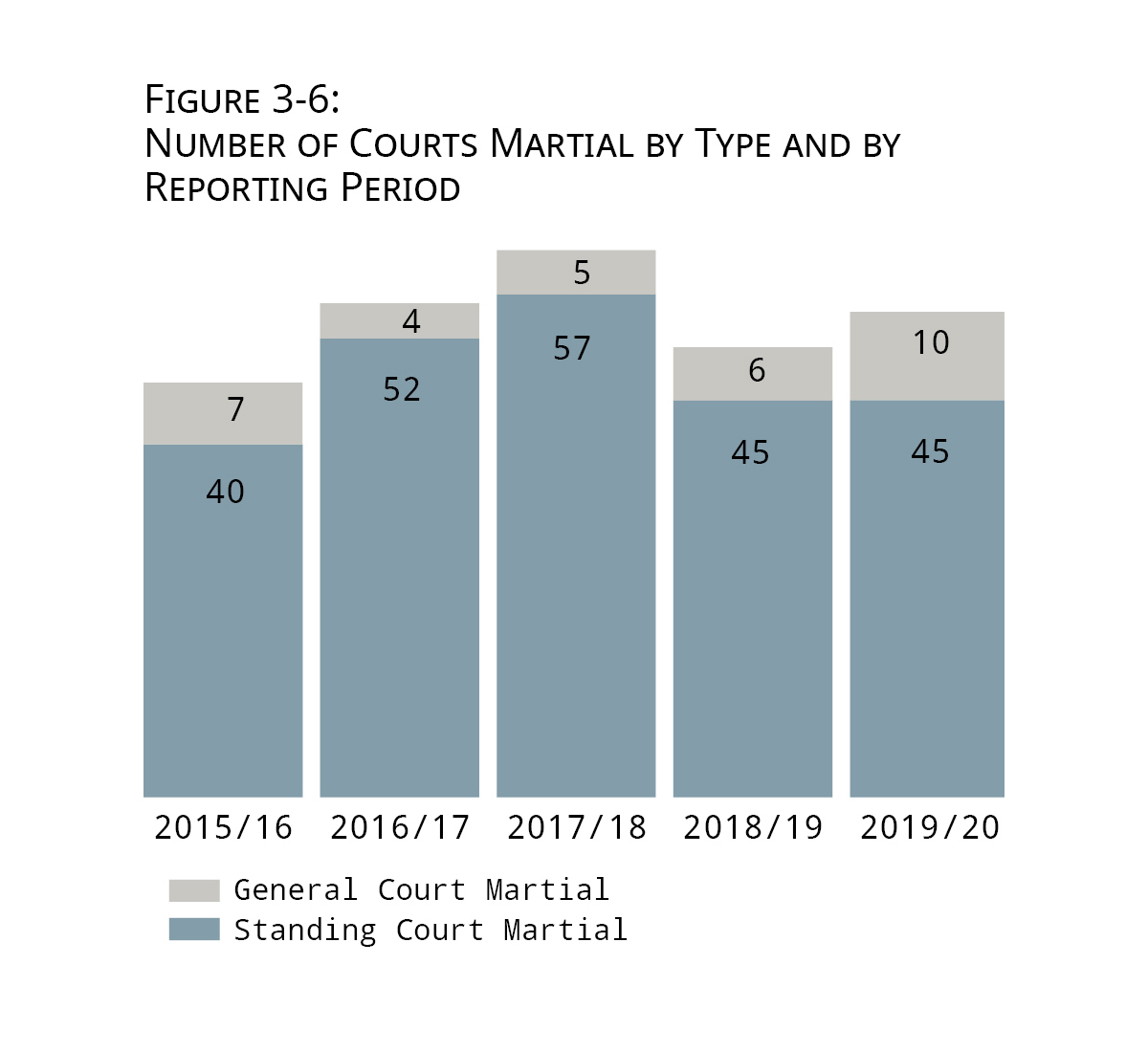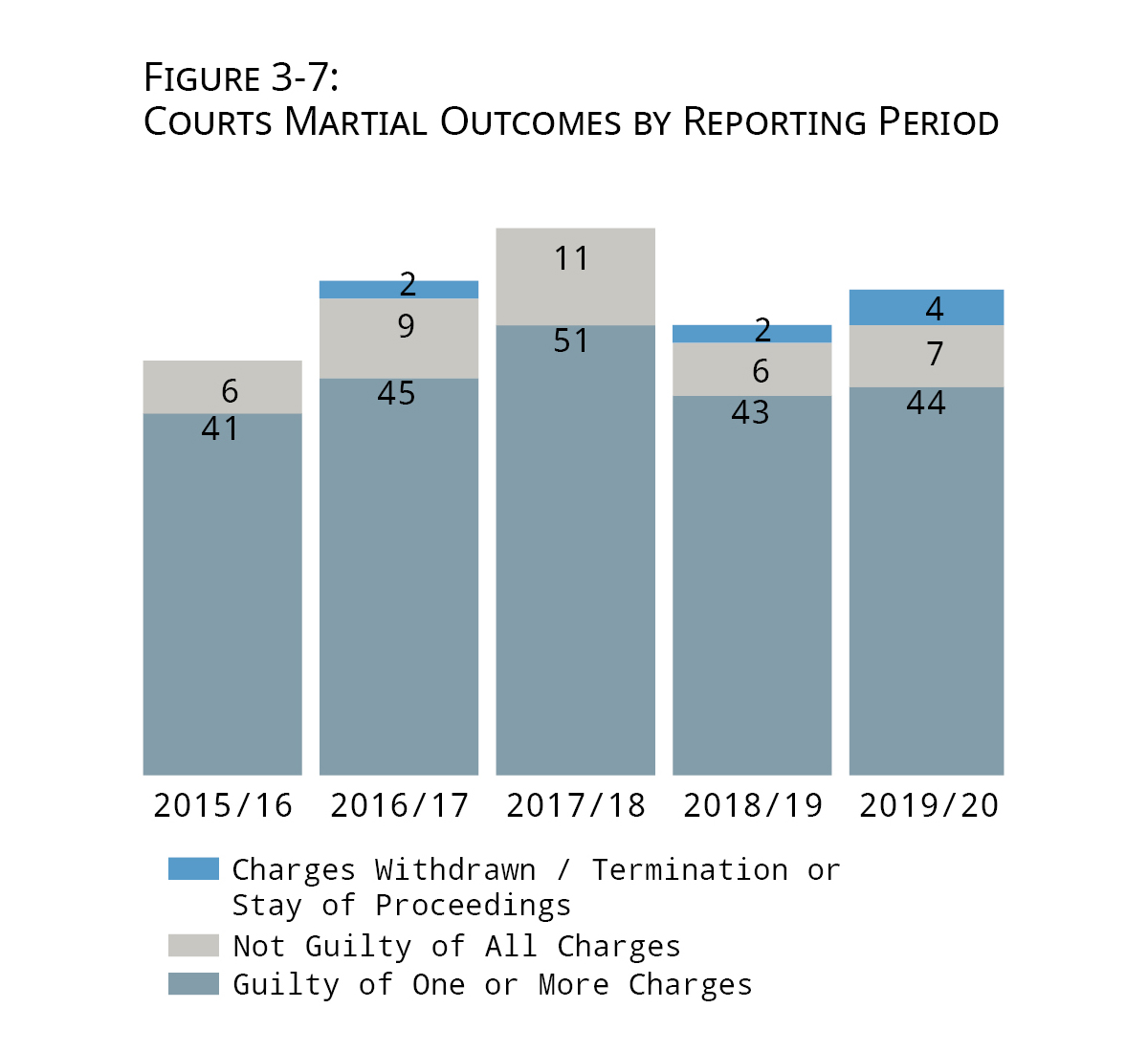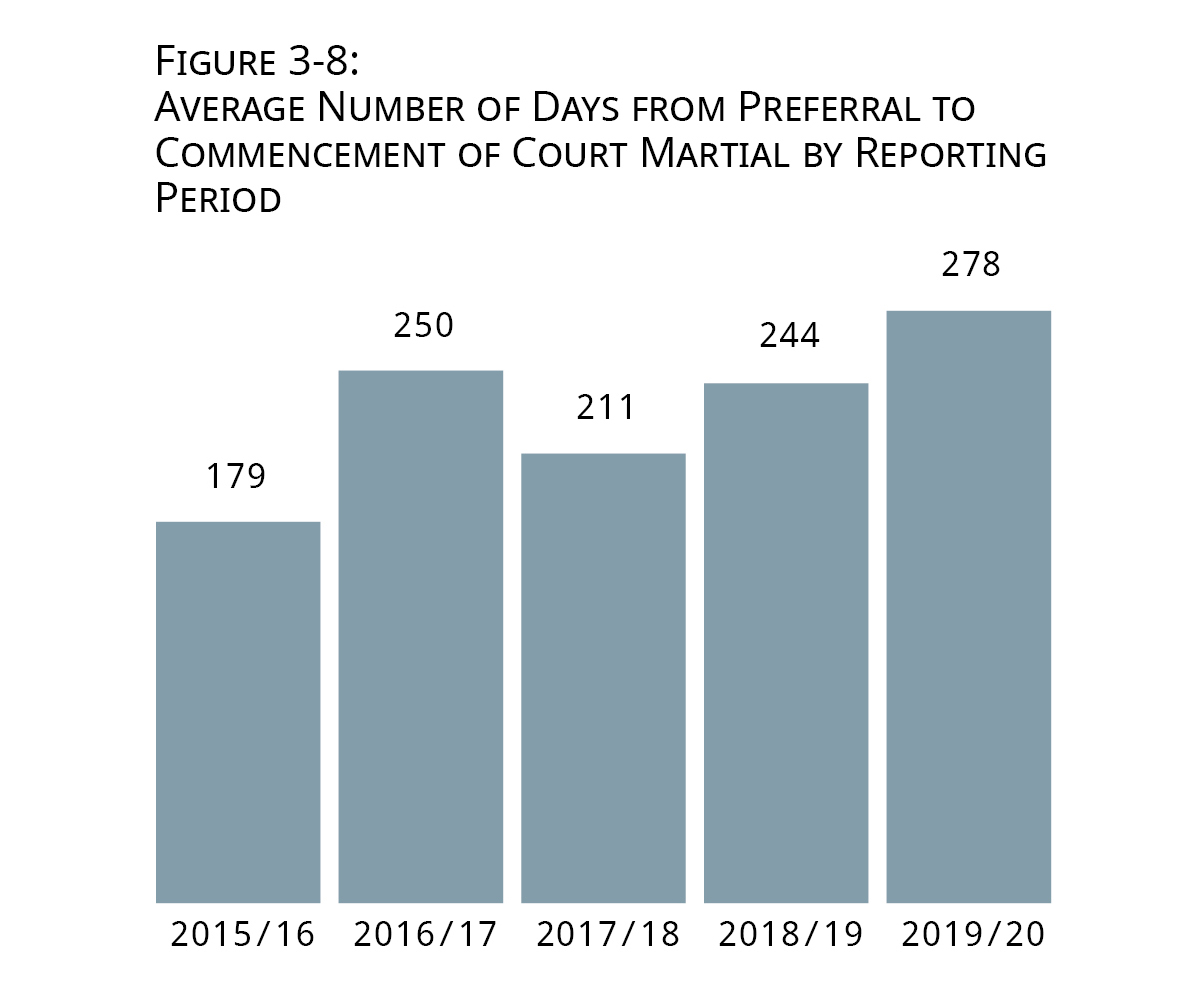Chapter Three: Court Martial Proceedings: Year in Review
The information and analysis provided below reflects the operations of the CMPS pertaining to pre-charge advice, referrals, post-charge reviews, courts martial, and custody review hearings over the course of the reporting period.
Overview
The CMPS’s total court martial caseload for the reporting period consisted of 130 files: 76 referrals were received during the reporting period and 54 files were carried over from the previous reporting period.
In addition, the CMPS handled 134 requests for pre-charge advice, 11 appeals to the CMAC and two (2) appeals to the SCC, for a total of 277 files over the course of the current reporting period (pre-charge, referral and appeal files combined).
Military judges are, in certain circumstances, required to review orders made to retain a CAF member in service custody. The DMP represents the CAF at all such hearings. No pre-trial custody review hearings were conducted during this reporting period.
Finally, a total of 55 courts martial were completed. Three (3) of those were new trials following appeals and orders made by the CMAC for the conduct of new courts martial: R v Cpl Cadieux, R v Capt Bannister, and R v Cpl Thibault.
Coronavirus (COVID-19) Pandemic
On 12 March 2020, in response to the COVID-19 pandemic and in accordance with CAF directives, the JAG imposed a restriction on all temporary duty travel for members of the OJAG. This led to the cancellation of the JAG CLE workshop. Similarly, the CMPS postponed its portion of the CLE workshop until the next reporting period.
With respect to courts martial, the Court Martial Administrator, acting on direction from the CMJ, canceled convening orders for courts martial that were scheduled to start in the month of March 2020 or in the months following the start of the next reporting period. A total of two (2) courts martial (R v P02 Breadner and R v Bdr Ferguson) were convened to start before the end of this reporting period, but were canceled by reason of COVID-19. In addition, in the case of two (2) courts martial (R v Maj Duquette and R v Cpl Thibault), trials were completed and findings were made by the presiding military judge, but sentencing hearings were postponed to the next reporting period because of COVID-19. The latter cases are accounted for in the total number of courts martial completed for this reporting period.
Pre-Charge Advice
RMPs within the CMPS are responsible to provide pre-charge advice to both the CFNIS and to unit legal advisors. In this reporting period, 129 requests for pre-charge advice were sent to the CMPS and five (5) requests had been pending from the previous reporting period. Of the 134 total requests, 122 pre-charge advice files were completed during this reporting period, leaving 12 files still pending at the end of the current reporting period.
The number of completed pre-charge advice files is consistent with the average number of completed files over the past three reporting periods.
Figure 3-1 shows the number of completed pre-charge files for the last four reporting periods.
Figure 3-1: Number of Completed Pre-Charge Files by Reporting Period
Figure 3-1: Graph breakdown
| 2016/17 | 2017/18 | 2018/19 | 2019/20 | |
|---|---|---|---|---|
| Completed Pre-Charge Files | 93 | 126 | 131 | 122 |
Referrals and Post-Charge Reviews
Number of Referrals Received During the Reporting Period
During this reporting period, 76 referrals were received by the DMP. This is a decrease of 26 referrals in comparison to the last reporting period (from 102 to 76). The yearly average for the last five reporting periods is 104.
The 76 referrals represents the lowest number of referrals received over the last five reporting periods. This decrease is explained by the impact of the CMAC decision in Beaudry and the subsequent ruling of the SCC, on 14 January 2019, to dismiss the DMP’s request for a stay of execution of the CMAC decision in Beaudry. This meant that persons accused of criminal offences committed in Canada for which the maximum sentence was five years imprisonment or more could not be tried within the military justice system. Immediately following the SCC’s ruling on the request for a stay of execution, the DMP communicated the decision to the highest levels of the chain of command within the CAF and set out his intentions as to how to proceed with those cases which were impacted by the CMAC decision in Beaudry. Consequently, from 19 September 2018 to 26 July 2019, many files involving “offences committed in Canada for which a maximum sentence is five years imprisonment or more” could not be referred to the DMP for lack of jurisdiction. For a detailed discussion of the impact of the CMAC decision in Beaudry and the SCC decision in Stillman, please refer to Chapter 4.
Caseload for the Reporting Period
When combined with the 54 files that were carried over from the previous reporting period, the caseload for this reporting period was 130 files.Footnote 20
Figure 3-2 shows the number of files handled for the past five reporting periods.
Figure 3-2: Caseload by Reporting Period
Figure 3-2: Graph breakdown
| 2015/16 | 2016/17 | 2017/18 | 2018/19 | 2019/20 | |
|---|---|---|---|---|---|
| Referrals Carried Over From Previous Year | 60 | 64 | 81 | 70 | 54 |
| Referrals Received | 98 | 126 | 118 | 102 | 76 |
| Total | 158 | 190 | 199 | 172 | 130 |
Preferrals and Non-Preferrals
During this reporting period, post-charge decisions were made by an RMP in 87 files, while seven (7) files were still pending a prosecutorial decision at the end of the current reporting period.
Of the 87 completed files, 56 files led to one or more charges being preferred for court martial and 31 files were not preferred. The preferral rate for this reporting period is 64%, which is consistent with the average preferral rate for the past five reporting periods (64%).
Figure 3-3 shows the number of preferrals and non-preferrals for the past five reporting periods.
Figure 3-3: Number of Preferrals and Non-Preferrals by Reporting Period
Figure 3-3: Graph breakdown
| 2015/16 | 2016/17 | 2017/18 | 2018/19 | 2019/20 | |
|---|---|---|---|---|---|
| Non-Preferrals | 36 | 44 | 41 | 47 | 31 |
| Preferrals |
62 | 82 | 55 | 107 | 56 |
| Total | 98 | 126 | 96 | 154 | 87 |
Time to Make a Prosecutorial Decision
The average number of days from the time a file was referred to the DMP until a RMP made the post-charge decision was approximately 70 days.Footnote 21 This represents a decrease of 18 days from the previous reporting period. It is also significantly below the average number of days for the past five reporting periods, which is 82 days.
Figure 3-4 illustrates the average number of days from referral to a post-charge decision for the past five reporting periods.
Figure 3-4: Average Number of Days from Referral to Post-Charge Decision by Reporting Period
Figure 3-4: Graph breakdown
| 2015/16 | 2016/17 | 2017/18 | 2018/19 | 2019/20 | |
|---|---|---|---|---|---|
| Days | 69 | 89 | 95 | 88 | 70 |
Preferral Rates by Investigative Agency
Although all files referred to the DMP are received through a referral authority, the incident giving rise to the charge may be investigated by one of three military investigative agencies: the CFNIS, an investigator with the military police who is not a member of the CFNIS, or a unit investigator. As such, the rate of preferrals varies between investigative agencies as their investigators have different levels of experience, proficiency and training.
During this reporting period, the preferral rate for those files investigated by the CFNIS was 79%.Footnote 22 This preferral rate is slightly higher than that of the regular military police (77%), but is markedly higher than that of unit investigators (46%).
This divergence of preferral rates has been consistent over the past several years, with those investigations conducted by the CFNIS being preferred at a higher rate than regular military police and unit investigators. For a complete overview of preferral rates by investigative agency over the past five reporting periods, please refer to Figure 3-5.
Figure 3-5: Preferral Rates by Investigative Agency and by Reporting Period
Figure 3-5: Graph breakdown
| 2015/16 | 2016/17 | 2017/18 | 2018/19 | 2019/20 | |
|---|---|---|---|---|---|
| CFNIS | 94 | 90 | 100 | 94 | 79 |
| Military Police |
64 | 66 | 53 | 75 | 77 |
| Unit | 54 | 54 | 37 | 53 | 46 |
The DMP has identified the discrepancy in preferral rates, and in particular the low preferral rate of unit investigations, as an issue and has taken a number of steps to improve the preferral rates of investigative agencies. For example, in the past reporting period, the CMPS amended a number of its policy directives to require RMPs to provide feedback to the investigator both when there is a decision not to prefer a charge and also at the conclusion of a court martial, with the aim of improving the quality of future investigations. The DMP also provided a RMP to attend and assist with the pilot serial of the Canadian Forces Military Police Academy Investigators Course, conducted in Borden in October and November 2019.
Courts Martial
This section provides an overview and analysis of cases heard at a court martial during the reporting period. For a complete list of all courts martial heard during the reporting period, please refer to Annex A.
Number of Courts Martial
A total of 55 courts martial were completed during this reporting period.Footnote 23 Of those, 45 were SCMs and 10 were GCMs. This is consistent with the historical average of courts martial for the past five years (54). In this reporting period, there was a slight increase in the number of GCMs in comparison to the average number of GCMs for the past five reporting periods (6). A complete picture of the number of courts martial for the last five reporting periods, by type, can be found at Figure 3-6.
Figure 3-6: Number of Courts Martial by Type and by Reporting Period
Figure 3-6: Graph breakdown
| 2015/16 | 2016/17 | 2017/18 | 2018/19 | 2019/20 | |
|---|---|---|---|---|---|
| General Court Martial | 7 | 4 | 5 | 6 | 10 |
| Standing Court Martial | 40 | 52 | 57 | 45 | 45 |
Court Martial Outcomes
Of the 55 courts martial that were held, accused persons were found guilty of one or more charges in 44 cases, found not guilty of all charges in seven (7) cases, had all charges withdrawn in three (3) cases, and had a termination of proceedings in one (1) case.
In addition, three (3) of the 55 courts martial were new trials following appeals and orders made by the CMAC for the conduct of a new court martial: R v Cpl Cadieux, R v Capt Bannister, and R v Cpl Thibault. For each of those three cases, a finding of guilty on at least one charge was obtained at the completion of the new trial.
Figure 3-7 shows a breakdown of court martial outcomes for the last five reporting periods.
Figure 3-7: Courts Martial Outcomes by Reporting Period
Figure 3-7: Graph breakdown
| 2015/16 | 2016/17 | 2017/18 | 2018/19 | 2019/20 | |
|---|---|---|---|---|---|
| Charges Withdrawn / Termination or Stay of Proceedings | 0 | 2 | 0 | 2 | 4 |
| Not Guilty of All Charges | 6 | 9 | 11 | 6 | 7 |
| Guilty of One or More Charges | 41 | 45 | 51 | 43 | 44 |
Punishments at Courts Martial
In this reporting period, a total of 42 sentences were handed down by courts martial, involving a total of 63 punishments.Footnote 24 While only one sentence may be given at a court martial, a sentence may involve a combination of more than one punishment.
Again this year, the most common punishment awarded at courts martial was a fine, with a total of 32 fines awarded representing 51% of all punishments. The next most common punishment awarded was a severe reprimand, which accounted for approximately 24% of all punishments. Three (3) custodial punishments were awarded; two of which were suspended by the presiding military judge.
A complete breakdown of all punishments imposed at courts martial for the last five reporting periods can be found in Table 3-1.
Table 3-1: Punishments at Court Martial
| Punishment | 2015/16 | 2016/17 | 2017/18 | 2018/19 | 2019/20 |
|---|---|---|---|---|---|
| Dismissal | 2 | 1 | 3 | 2 | 1 |
| Imprisonment | 3 | 4 | 7 | 3 | 2**** |
| Detention | 4 | 4* | 4** | 1*** | 1***** |
| Reduction in Rank | 3 | 9 | 9 | 2 | 3 |
| Forfeiture of Seniority | 0 | 0 | 0 | 0 | 1 |
| Severe Reprimand | 10 | 6 | 11 | 9 | 15 |
| Reprimand | 13 | 17 | 20 | 4 | 6 |
| Fine | 32 | 39 | 38 | 35 | 32 |
| Minor Punishments | 0 | 0 | 3 | 0 | 0 |
| Absolute Discharge****** | N/A | N/A | N/A | 0 | 2 |
| Total | 67 | 80 | 95 | 56 | 63 |
* One of these punishments was suspended by the presiding military judge.
** Three of these punishments were suspended by the presiding military judge.
*** This punishment was suspended by the presiding military judge.
**** One of these punishments was suspended by the presiding military judge.
***** This punishment was suspended by the presiding military judge.
******Absolute discharges became available to presiding military judges as of 1 September 2018 under section 203.8 of the NDA.
Time from Preferral of Charge(s) until Commencement of Court Martial
During this reporting period, the average number of days from the preferral of charge(s) until the commencement of the court martial was 278 days.Footnote 25 This is an increase of 34 days in comparison to the previous reporting period and is 46 days above the past five year average of 202 days. This increase was due to the CMAC decision in Beaudry, as a number of cases already proceeding in the military system could not be heard until jurisdiction over the offences had been restored. Figure 3-8 shows the average number of days from the preferral of charges until the commencement of the court martial for the last five reporting periods.
Figure 3-8: Average Number of Days from Preferral to Commencement of Court Martial by Reporting Period
Figure 3-8: Graph breakdown
| 2015/16 | 2016/17 | 2017/18 | 2018/19 | 2019/20 | |
|---|---|---|---|---|---|
| Days | 179 | 250 | 211 | 244 | 278 |
Offence Categories
All files prosecuted by the DMP are categorized into one of four broad offence categories: sexual misconduct, alcohol and drugs, conduct offences and fraud and other property-related offences. Table 3-2 provides an overview of the number of completed courts martial for each offence category.
Table 3-2: Courts Martial by Offence CategoryPunishment
| Offence Category | Completed Courts Martial 2016-17 | Completed Courts Martial 2017-18 | Completed Courts Martial 2018-19 | Completed Courts Martial 2019-20 |
|---|---|---|---|---|
| Sexual Misconduct | 21 | 20 | 20 | 25 |
| Alcohol and Drugs | 7 | 2 | 5 | 1 |
| Conduct | 21 | 34 | 21 | 20 |
| Fraud and Property | 8 | 6 | 5 | 9 |
| Total | 57Footnote 26 | 62 | 51 | 55Footnote 27 |
Notable Court Martial Cases
This section provides a summary of three notable courts martial that were held during this reporting period.
R v Dutil, 2019 CM 3003
Col Dutil, the then-Chief Military Judge (CMJ), was charged by a Special Prosecutor appointed pursuant to the DMP Policy Directive #016/17 – Appointment of Special Prosecutors. At the beginning of his SCM, which was convened on 10 June 2019, Col Dutil was facing four charges (one count of willfully making false statements contrary to s. 125(a) NDA, one count of fraud contrary to s. 380 of the Criminal Code under s. 130 NDA, one count of an act of fraudulent nature contrary s. 117(f) NDA, and one count of conduct to the prejudice of good order and discipline contrary to s. 129 NDA).
At the opening of his trial, Col Dutil made an objection to the constitution of the court martial and requested the recusal of the presiding military judge on the ground of partiality. On 17 June 2019, the presiding military
judge recused himself and, as Deputy CMJ, read a letter where he stated his refusal to assign any of the three other eligible military judges (‘the non‑assignment decision’). The court martial proceedings were adjourned indefinitely.Footnote 28
The DMP applied to the Federal Court for judicial review seeking a writ of mandamus to force the Deputy CMJ, under s. 165.25 NDA, to appoint a replacement and alternatively took the position that the decision was unreasonable. On 3 March 2020, the Federal Court dismissed the application for judicial review, finding that the decision was reasonable and stating that the conditions required to issue a writ of mandamus had not been met.Footnote 29 The Federal Court further noted that, apart from amending the NDA, the assignment of an ad hoc judge from a superior court would constitute the best alternative to address the issue.Footnote 30
On 13 March 2020, DMP made the decision to withdraw all charges in this case.
R v Cadieux, 2019 CM 2011
Cpl Cadieux was originally charged with one count of an offence contrary to s. 130 NDA, that is, sexual assault contrary to s. 271 of the Criminal Code, and one count of drunkenness contrary to s. 97 NDA. This court martial was a new trial following an appeal from the acquittals of Cpl Cadieux at his SCM on 12 May 2017. In a unanimous decision rendered on 10 September 2018, the CMAC granted the appeal, quashed the acquittals and ordered a new trial.Footnote 31
At the conclusion of the new trial the presiding military judge found that the victim was incapable of consenting to the sexual activity of kissing. As for the mens rea, the Court found that the defence of honest but mistaken belief was not available to Cpl Cadieux under s. 273.2 of the Criminal Code as it was vitiated by his recklessness, willful blindness and his failure to take reasonable steps. On drunkenness, the presiding military judge accepted that Cpl Cadieux’s actions were “owing to alcohol”, finding that the simple act of getting into the driver’s seat of a car, with the keys inside the vehicle, while under the influence of alcohol or a drug is normally sufficient to attract jeopardy in a criminal context and that it meets the disorderly test of the offence of drunkenness.Footnote 32
On 22 May 2019, Cpl Cadieux was convicted on both charges. He was sentenced to detention for a period of 60 days and a severe reprimand. The punishment of detention was suspended.
R v D’Amico (citation not yet available)
Cpl D’Amico was charged with neglect to the prejudice of good order and discipline contrary to s. 129 NDA. On 2 October 2019, the CDS issued an order in the form of a letter designating the Deputy Vice Chief of the Defence Staff (DVCDS) as the Commanding Officer (CO) with respect to disciplinary matters involving military judges. Cpl D’Amico brought an application for plea in bar of trial under QR&O 112.24, alleging a breach of his right to a fair and public hearing by an independent and impartial tribunal under s. 11(d) of the Charter and seeking a stay of proceedings. The same application was first made in the matter of R v Pett.Footnote 33
The presiding military judge found that the CDS order undermined the necessary guarantees of judicial impartiality and that military judges cannot be tried for service offences while holding office, thus the CDS order infringed the rights of Cpl D’Amico protected under s. 11(d) of the Charter. However, she declined to stay the proceedings. On 9 March 2020, Cpl D’Amico was found guilty by a panel at a GCM and received an absolute discharge as a sentence.
Appeals
This section provides an overview of those cases which were appealed to the CMAC as well as to the SCC. Please refer to Annex B for an overview of the disposition of cases appealed to the CMAC and to Annex C for those cases referred to the SCC.
Decisions Rendered by the CMAC
R v Bannister, 2019 CMAC 2
Capt Bannister was acquitted of six charges (three counts of disgraceful conduct and three alternate counts of conduct to the prejudice of good order and discipline) at an SCM on 27 February 2018.
The DMP appealed, arguing that the military judge applied a test that is too restrictive, that he failed to consider the risk of harm demonstrated by the evidence, that he erred by conflating the concepts of inferential reasoning and the taking of judicial notice and that he erred in requiring evidence of actual harm to good order and discipline.
The CMAC granted the appeal, quashed the acquittals and ordered a new trial on all charges before a different military judge. The CMAC decided that whether something is disgraceful or prejudicial to good order and discipline shall be analyzed through an objective standard, taking into account the totality of the context in which it occurred and on the basis of the trier of facts’ own military experience and general service knowledge. The Court further held that actual harm is not required for proving prejudice to good order and discipline. Conduct that tends to or is likely to cause harm is sufficient.
R v MacIntyre, 2019 CMAC 3
On 27 June 2018, a GCM held in Halifax, Nova Scotia, found Sgt MacIntyre not guilty of one charge of sexual assault. On 26 July 2018, the DMP appealed this case to the CMAC on two grounds: 1) that the military judge erred in law in instructing the panel that they needed to find that the accused knew that the complainant was not consenting despite his previous ruling that the defence of honest but mistaken belief in consent did not apply; and, 2) the military judge erred in law in instructing the panel that they could find the accused not guilty of the offence charged, if they found that the police investigation was inadequate.
The CMAC dismissed the appeal and found that “knowledge, wilful blindness, or recklessness as to the complainant’s lack of consent is an essential mens rea element of sexual assault and it is not an error of law to simply instruct the trier of fact on the element of knowledge of lack of consent.”Footnote 34 The CMAC also dismissed the second ground of appeal, finding no error in the military judge’s comments regarding the investigation. Leave to appeal to the SCC was denied.
R v Edwards, 2019 CMAC 4
On 16 November 2018, a SCM held in Halifax, Nova Scotia, found LS Edwards not guilty of one charge of prejudice to good order and discipline. The offence alleged that the accused used cocaine, contrary to QR&O 20.04, between 25 September 2015 and 23 July 2016, at or near Halifax, Nova Scotia.
On 11 December 2018, the DMP appealed this case to the CMAC on two grounds: 1) that the military judge erred in requiring specific evidence on elements and matters that were immaterial to the proof of the offence (time and place); and, 2) the military judge erred in his assessment of the confession by analysing the evidence through a piecemeal approach and failing to consider the evidence as a whole.
The CMAC confirmed that “from time immemorial, a date specified in an indictment or information has not been held to be a material matter”Footnote 35 and that “courts martial are clothed with unlimited territorial jurisdiction, which extends throughout Canada and the world, but for those alleged offences arising in Canada referred to in s. 70 of the NDA.”Footnote 36 The CMAC did not consider the second ground of appeal as it was satisfied that the first ground of appeal was determinative of the matter. A new trial was ordered before a different military judge.
R v Banting, 2019 CMAC 5
On 4 April 2019, Lt Banting was pronounced not guilty of one charge pursuant to s. 129 NDA for having used inappropriate sexualized language while lecturing military candidates on combat first aid at the Canadian Special Operations Training Centre. The military judge found that no prima facie case had been made out by the prosecution.
On 29 April 2019, the DMP appealed on the ground that the military judge erred in law in her determination that no prima facie case had been made out in respect of the charge by finding that there was no evidence of prejudice upon which a properly instructed panel could reasonably convict the accused. In a unanimous decision directly from the bench, the CMAC held that the military judge was correct in her finding that there was no evidence of prejudice to good order and discipline.
At the end of the reporting period, a motion for costs by the Respondent was before the CMAC.Footnote 37
R v Darrigan, 2020 CMAC 1
At his SCM held in Halifax, Nova Scotia from 14-16 May 2019, Petty Officer 2nd Class (PO2) Darrigan pleaded guilty to one count of stealing when entrusted contrary to s. 114 NDA and to one count of selling the items improperly contrary to s. 116(a) NDA. He was sentenced by the presiding military judge to a severe reprimand, a fine in the amount of $8,000 and an order for restitution for $750.
The DMP appealed this case, arguing that the military judge erred in applying the sentencing principles of proportionality and parity, in over-emphasizing the mitigating factors and in imposing a sentence that was demonstrably unfit as stealing from an employer should attract a custodial sentence in the absence of exceptional factors.
The CMAC dismissed the appeal and upheld the sentence imposed by the military judge, as it was of the view that no error was committed in applying the relevant sentencing principles. The Court found that as a separate system, the military justice system is not bound to follow civilian precedents when it is not in the interest of maintaining discipline, efficiency and morale of the CAF. The Court further rejected the argument that absent exceptional circumstances, a custodial sentence was required for breach of trust offences.
Appeals Initiated at the CMAC
R v McGregor, CMAC-602
Following an SCM, Cpl McGregor was found guilty of an offence under s. 130 NDA, that is, sexual assault, contrary to s. 271 of the Criminal Code; two counts under s. 130 NDA, that is, voyeurism, contrary to s. 162(1) of the Criminal Code; an offence under s. 130 NDA, that is, possession of a device for surreptitious interception of private communications, contrary to s. 191(1) of the Criminal Code; cruel or disgraceful conduct, contrary to s. 93 NDA; and, conduct to the prejudice of good order and discipline, contrary to s. 129 NDA. He was sentenced to imprisonment for a period of 36 months and dismissal with disgrace from Her Majesty’s service.
At trial, Cpl McGregor made an application under s. 8 of the Charter, alleging that the search of his home in Virginia, USA and the subsequent seizure and search of electronics was unlawful. This was dismissed by the military judge after a contested hearing on 13 September 2018. The evidence seized was admitted in evidence.
Cpl McGregor appeals the legality of the finding concerning his application under s. 8 of the Charter and further seeks leave to appeal his conviction and sentence.
R v Pett, CMAC-603
MCpl Pett was charged with one count of an offence contrary to the NDA s. 85 (insubordinate behaviour) and one count of an offence contrary to the NDA s. 95 (abuse of subordinates).
On 2 October 2019, the CDS issued an order in the form of a letter designating the DVCDS as the CO with respect to disciplinary matters involving military judges. At his SCM, MCpl Pett brought an application for plea in bar of trial alleging a breach of his right to a fair and public hearing by an independent and impartial tribunal under s. 11(d) of the Charter and seeking a stay of proceedings. The application was denied by the military judge and MCpl Pett was found guilty of both charges and sentenced to a reprimand and a $1,500 fine.
MCpl Pett appealed the legality of the finding concerning his application under s. 11(d) of the Charter. However, on 23 April 2020 (during the next reporting period), he abandoned the appeal.
R v Renaud, CMAC-604
Capt Renaud was found guilty at his SCM of three counts of conduct to the prejudice of good order and discipline, contrary to s. 129 NDA, for inappropriate sexualized comments made during his deployment on Operation REASSURANCE in Romania. He was sentenced to a severe reprimand and a fine in the amount of $2,500.
Capt Renaud appeals the legality of the military judge’s findings on all counts of conduct to the prejudice of good order and discipline.
Please refer to Annex B for an overview of all appeals at the CMAC for the reporting period.
Decision Rendered by the SCC
R v Stillman, 2019 SCC 40
Please refer to Chapter 4 for a summary of the SCC decision in R v Stillman.
Applications for Leave to Appeal to the SCC
R v MacIntyre (SCC docket 38838)
On behalf of the MND, the DMP sought leave to appeal the case of R v MacIntyre, 2019 CMAC 3 to the SCC. Leave to appeal was denied on 9 January 2020.
Please refer to Annex C for an overview of all appeals at the SCC during the reporting period.
